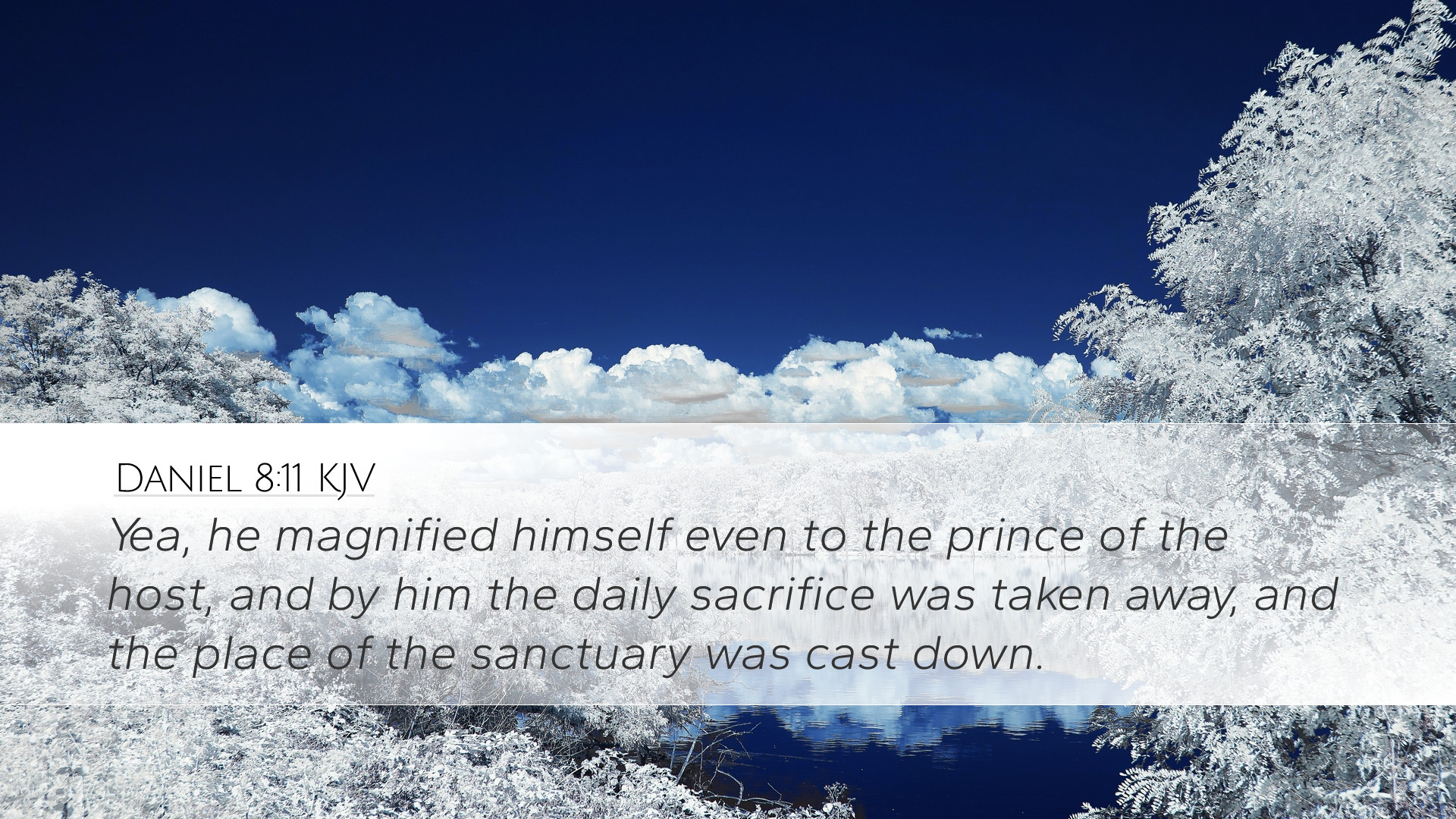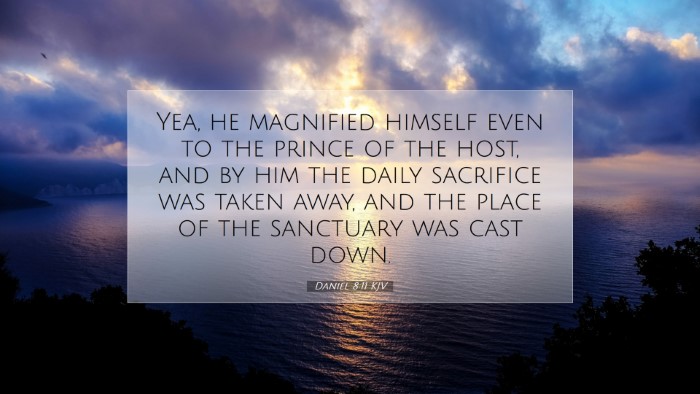Commentary on Daniel 8:11
Daniel 8:11 states: "Yea, he magnified himself even to the prince of the host, and by him the daily sacrifice was taken away, and the place of his sanctuary was cast down." This verse is rich in theological implications and prophetic significance, offering a profound insight into the nature of power, the sacrificial system, and the eventual judgment of God.
Context and Background
The Book of Daniel is divided into two main sections: the first part (chapters 1-6) narrates historical events concerning Daniel and his companions, while the second part (chapters 7-12) contains apocalyptic visions and prophecies. Daniel 8 is particularly notable for its vision of a ram and a goat, symbolizing kingdoms and conflicts to come. The events encapsulated in this chapter are pivotal in understanding the struggle between divine authority and earthly powers.
Verse Analysis
In Daniel 8:11, we see the emergence of a figure who exemplifies hubris and opposition to God. The phrase "he magnified himself" indicates a self-exalting spirit, characteristic of antagonistic rulers throughout history. This self-aggrandizement can be compared to the sentiments found in Isaiah 14:13-14 where the King of Babylon aspires to ascend to the heights of heaven.
1. The Prince of the Host
The term "prince of the host" is commonly interpreted as a reference to the high priest or, more broadly, to the authority of God in the heavenly realm. This title symbolizes divine authority and represents God's protection over his people. By magnifying himself against this figure, the antagonist attempts to usurp not only authority but also the very access to God’s provisions and grace.
2. The Daily Sacrifice
Continuing with the verse, the removal of the "daily sacrifice" signifies a profound desecration. In Jewish practice, daily sacrifices were essential for maintaining a covenant relationship with God. Their suspension symbolizes a significant disruption in worship and communion with God, representing an affront to God's instituted system of grace and atonement. Matthew Henry suggests that such an act embodies a broader assault on true worship, indicating an attempt to alter or eradicate divine patterns ordained by God.
3. The Sanctuary Cast Down
The "place of his sanctuary was cast down" refers to the desecration of the temple, which holds deep significance both in historical and prophetic contexts. The temple is not only a physical structure but also a symbol of God's presence among His people. Adam Clarke notes that the casting down of the sanctuary can be seen as indicative of a time when falsehood prevails and the genuine worship of God is subverted by oppressors. This foreshadows future events in history, particularly relating to the Maccabean struggle and ultimately the coming Antichrist figure.
Theological Implications
The themes present in this verse resonate through history and are applicable for contemporary believers. They encapsulate the struggle between good and evil, divine order and chaos, sacred and profane. The context of sacrificial worship informs modern understanding of worship and the value of the sacrifices made for spiritual community.
1. The Nature of Idolatry
Daniel 8:11 serves as a warning against the nature of idolatry and self-exaltation. The pride demonstrated by the antagonist in this passage mirrors the persistent human tendency to elevate oneself above God. As noted by Albert Barnes, any attempt to remove the centrality of worship and relationship with God inevitably leads to spiritual ruin.
2. Prophetic Foreshadowing
The verse acts as a prophetic foreshadowing not only of past events but also of future occurrences. The actions described parallel the characteristics of the Antichrist as elaborated in the New Testament, where there is an ultimate rebellion against God. New Testament believers are cautioned to remain vigilant, reflecting on the spiritual warfare that continues to unfold around them.
Practical Applications
For pastors and theologians, the analysis of Daniel 8:11 provides rich material for preaching and teaching on the importance of true worship and the dangers posed by self-exaltation and idolatry. It encourages introspection regarding the prioritization of God within one’s ministry and personal life.
- Upholding the Importance of True Worship: Encourage congregations to remain steadfast in worship practices, recognizing their significance in maintaining a close relationship with God.
- Guarding Against Spiritual Complacency: Remind believers of the constant need for vigilance against any ideologies or practices that may seek to diminish the centrality of Christ and the work of salvation.
- Understanding God’s Sovereignty: Develop teachings on God’s ultimate sovereignty over history and evil, instilling hope that despite the appearance of chaos, God retains control over the unfolding of His redemptive plan.
Conclusion
In summary, Daniel 8:11 is not merely a historical account but a multidimensional text that speaks volumes about the nature of power, the sanctity of worship, and God’s enduring sovereignty. The insights drawn from the commentaries of Matthew Henry, Albert Barnes, and Adam Clarke serve to deepen our understanding of this pivotal passage. As we reflect on these truths, may our hearts align with the call to honor God above all and to remain steadfast in faith and worship.


